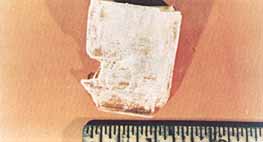Potassium sodium tartrate

Potassium sodium tartrate, also known as Rochelle salt or by its chemical formula KNaC₄H₄O₆, is a double salt of tartaric acid with potassium and sodium ions. It is commonly used in a variety of applications, including the food industry as an emulsifier, in the medical field as a laxative, and in the chemical industry for the preparation of other tartrates and as a component in Fehling's solution, a chemical reagent used to differentiate between water-soluble carbohydrates.
History[edit]
Potassium sodium tartrate was first prepared by an apothecary in Rochelle, France, in the 17th century, which is how it got its common name, Rochelle salt. It played a significant role in the development of chemistry in the 18th and 19th centuries, particularly in the work of Carl Wilhelm Scheele and Justus von Liebig who used it in their research.
Chemical Properties[edit]
Potassium sodium tartrate is a colorless to white crystalline powder that is soluble in water. Its aqueous solution is neutral or slightly alkaline. The compound is stable under normal conditions but decomposes when heated, producing carbon dioxide and leaving a residue of potassium carbonate and sodium carbonate.
Applications[edit]
Food Industry[edit]
In the food industry, potassium sodium tartrate is used as a stabilizer, pH control agent, and emulsifier. It is also a key ingredient in baking powder, where it acts as an acidulant to activate baking soda.
Medical Field[edit]
As a mild laxative, it has been used in traditional medicine. However, its use in modern medicine is limited due to the availability of more effective and safer alternatives.
Chemical Industry[edit]
Potassium sodium tartrate is essential in the chemical industry, especially as a component of Fehling's solution. Fehling's solution is used to test for the presence of reducing sugars, where the tartrate serves as a complexing agent for copper(II) ions, allowing them to remain in solution at an alkaline pH.
Safety[edit]
Potassium sodium tartrate is generally regarded as safe when used in food. However, like all chemicals, it should be handled with care, and appropriate safety measures should be taken to avoid ingestion, inhalation, or contact with skin and eyes in its pure form.
Environmental Impact[edit]
The environmental impact of potassium sodium tartrate is considered low. It is biodegradable and does not accumulate in the environment. However, as with all chemical substances, it should be disposed of responsibly to minimize any potential harm to the environment.
Ad. Transform your life with W8MD's Budget GLP-1 injections from $75


W8MD offers a medical weight loss program to lose weight in Philadelphia. Our physician-supervised medical weight loss provides:
- Weight loss injections in NYC (generic and brand names):
- Zepbound / Mounjaro, Wegovy / Ozempic, Saxenda
- Most insurances accepted or discounted self-pay rates. We will obtain insurance prior authorizations if needed.
- Generic GLP1 weight loss injections from $75 for the starting dose.
- Also offer prescription weight loss medications including Phentermine, Qsymia, Diethylpropion, Contrave etc.
NYC weight loss doctor appointmentsNYC weight loss doctor appointments
Start your NYC weight loss journey today at our NYC medical weight loss and Philadelphia medical weight loss clinics.
- Call 718-946-5500 to lose weight in NYC or for medical weight loss in Philadelphia 215-676-2334.
- Tags:NYC medical weight loss, Philadelphia lose weight Zepbound NYC, Budget GLP1 weight loss injections, Wegovy Philadelphia, Wegovy NYC, Philadelphia medical weight loss, Brookly weight loss and Wegovy NYC
|
WikiMD's Wellness Encyclopedia |
| Let Food Be Thy Medicine Medicine Thy Food - Hippocrates |
Medical Disclaimer: WikiMD is not a substitute for professional medical advice. The information on WikiMD is provided as an information resource only, may be incorrect, outdated or misleading, and is not to be used or relied on for any diagnostic or treatment purposes. Please consult your health care provider before making any healthcare decisions or for guidance about a specific medical condition. WikiMD expressly disclaims responsibility, and shall have no liability, for any damages, loss, injury, or liability whatsoever suffered as a result of your reliance on the information contained in this site. By visiting this site you agree to the foregoing terms and conditions, which may from time to time be changed or supplemented by WikiMD. If you do not agree to the foregoing terms and conditions, you should not enter or use this site. See full disclaimer.
Credits:Most images are courtesy of Wikimedia commons, and templates, categories Wikipedia, licensed under CC BY SA or similar.
Translate this page: - East Asian
中文,
日本,
한국어,
South Asian
हिन्दी,
தமிழ்,
తెలుగు,
Urdu,
ಕನ್ನಡ,
Southeast Asian
Indonesian,
Vietnamese,
Thai,
မြန်မာဘာသာ,
বাংলা
European
español,
Deutsch,
français,
Greek,
português do Brasil,
polski,
română,
русский,
Nederlands,
norsk,
svenska,
suomi,
Italian
Middle Eastern & African
عربى,
Turkish,
Persian,
Hebrew,
Afrikaans,
isiZulu,
Kiswahili,
Other
Bulgarian,
Hungarian,
Czech,
Swedish,
മലയാളം,
मराठी,
ਪੰਜਾਬੀ,
ગુજરાતી,
Portuguese,
Ukrainian
